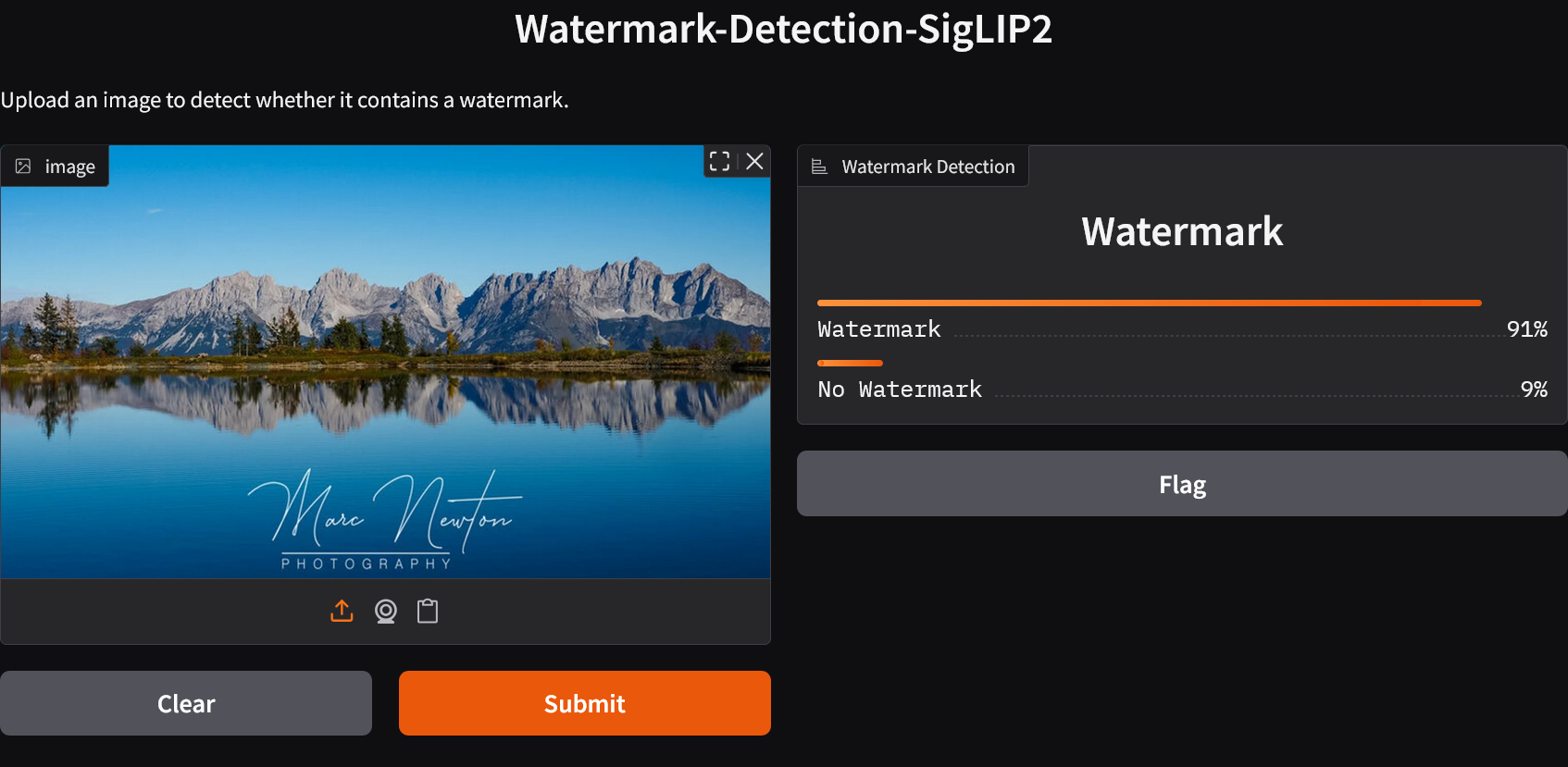metadata
license: apache-2.0
datasets:
- qwertyforce/scenery_watermarks
language:
- en
base_model:
- google/siglip2-base-patch16-224
pipeline_tag: image-classification
library_name: transformers
tags:
- Image-Classification
- Watermark-Detection
- SigLIP2
Watermark-Detection-SigLIP2
Watermark-Detection-SigLIP2 is a vision-language encoder model fine-tuned from google/siglip2-base-patch16-224 for binary image classification. It is trained to detect whether an image contains a watermark or not, using the SiglipForImageClassification architecture.
Watermark detection works best with crisp and high-quality images. Noisy images are not recommended for validation.
SigLIP 2: Multilingual Vision-Language Encoders with Improved Semantic Understanding, Localization, and Dense Features https://arxiv.org/pdf/2502.14786
Classification Report:
precision recall f1-score support
No Watermark 0.9290 0.9722 0.9501 12779
Watermark 0.9622 0.9048 0.9326 9983
accuracy 0.9427 22762
macro avg 0.9456 0.9385 0.9414 22762
weighted avg 0.9435 0.9427 0.9424 22762
Label Space: 2 Classes
The model classifies an image as either:
Class 0: "No Watermark"
Class 1: "Watermark"
Install dependencies
pip install -q transformers torch pillow gradio
Inference Code
import gradio as gr
from transformers import AutoImageProcessor, SiglipForImageClassification
from PIL import Image
import torch
# Load model and processor
model_name = "prithivMLmods/Watermark-Detection-SigLIP2" # Update this if using a different path
model = SiglipForImageClassification.from_pretrained(model_name)
processor = AutoImageProcessor.from_pretrained(model_name)
# Label mapping
id2label = {
"0": "No Watermark",
"1": "Watermark"
}
def classify_watermark(image):
image = Image.fromarray(image).convert("RGB")
inputs = processor(images=image, return_tensors="pt")
with torch.no_grad():
outputs = model(**inputs)
logits = outputs.logits
probs = torch.nn.functional.softmax(logits, dim=1).squeeze().tolist()
prediction = {
id2label[str(i)]: round(probs[i], 3) for i in range(len(probs))
}
return prediction
# Gradio Interface
iface = gr.Interface(
fn=classify_watermark,
inputs=gr.Image(type="numpy"),
outputs=gr.Label(num_top_classes=2, label="Watermark Detection"),
title="Watermark-Detection-SigLIP2",
description="Upload an image to detect whether it contains a watermark."
)
if __name__ == "__main__":
iface.launch()
Demo Inference
Watermark
 |
 |
 |
 |
 |
 |
 |
 |
 |
No Watermark
 |
 |
 |
 |
 |
 |
 |
 |
 |
Intended Use
Watermark-Detection-SigLIP2 is useful in scenarios such as:
- Content Moderation – Automatically detect watermarked content on image sharing platforms.
- Dataset Cleaning – Filter out watermarked images from training datasets.
- Copyright Enforcement – Monitor and flag usage of watermarked media.
- Digital Forensics – Support analysis of tampered or protected media assets.

